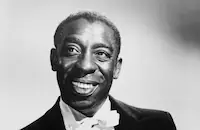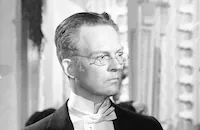The Mind Reader

Brief Synopsis
Cast & Crew
Roy Del Ruth
Warren William
Constance Cummings
Allen Jenkins
Natalie Moorhead
Mayo Methot
Film Details
Technical Specs

Synopsis
After trying several different rackets, a confidence man decides to go into business as a mind reader. Now known as Chandra the Great, he travels through small towns with his sidekick Frank, pretending to read minds as Frank feeds him the questions through a concealed microphone. In one town, the owner of a purse that Frank has stolen comes to Chandra for help. Because Chandra is very attracted to the woman's niece, Sylvia Roberts, he reveals its hiding place. To impress her, he acts as if he were sincerely interested in helping people with his special powers. When she volunteers her services, he hires her as his secretary. Chandra manages to keep the truth about his racket a secret from Sylvia, until one night when Frank does not show up on time and Sylvia must read the questions. Chandra convinces her that the carnival act is merely advertising for his real work, answering the letters from people asking for his advice. Slowly Sylvia becomes suspicious of his sincerity, and when a woman commits suicide after Chandra's advice proves false, Sylvia demands that he go straight. Now using the name Chandler, he gets work as a door-to-door salesman, but sales are so poor that Frank, who is working as a chauffeur, easily persuades him to go back into the mind reading business. As Dr. Munro, Chandra gets information from Frank about the mistresses of wealthy men and sells it to their wives. Sylvia has no idea that her husband is the notorious Dr. Munro. When one of her friends decides to divorce her husband after a visit to the mind reader, Sylvia visits his office, planning to confront him. She learns Munro's identity when one of the divorced husbands attacks Chandra who shoots the husband in the struggle. Chandra runs out the back way, leaving Sylvia to face murder charges. Much later, he returns to clear her name and asks her to wait for him until his release.

Director

Roy Del Ruth
Cast

Warren William

Constance Cummings

Allen Jenkins

Natalie Moorhead

Mayo Methot

Clarence Muse
Earle Foxe

Donald Dillaway
Clara Blandick
Harry Beresford
Harry Stubbs
Robert Greig
Ruthelma Stevens
Crew

Film Details
Technical Specs

Articles
The Mind Reader
Now, when you want to write the story of a professional con artist, who better than someone who is not only a great con artist himself but one of the 20th Century's greatest wits as well? Famed raconteur Wilson Mizner co-authored The Mind Reader during his short stay in Hollywood while on the lam from an elaborate hoax he perpetrated in Florida a few years before.
Wilson was one of Broadway's leading lights during the Teens and Twenties, rising to scandalous celebrityhood after the 29-year old married an 80-year old heiress. From there he dove headlong into managing boxing matches (which he fixed) and the Rand Hotel. What made Wilson even more memorable, however, was his well-known wit. At his hotel, patrons were greeted by the sign "Guests must carry out their own dead." When one of his boxers met a violent end, Mizner merely said, "Tell 'em to start counting ten over him, and he'll get up."
In the late 1920's Mizner set up the greatest scheme of all. He and his brother Addison retired south to Florida where they began snapping up cheap land and selling it for inflated prices, using their connections to Broadway's leading names and newspaper columnists for publicity. Ultimately the Great Florida Land Boom went bust and Wilson fled to Hollywood one step ahead of the law.
There Wilson set up shop at Warner Brothers, usually sleeping on a couch in the writers's quarters and being awoken whenever his writing partners needed a tasty quip with a hard, cynical edge. Wilson must have been wide awake for most of the writing of The Mind Reader as it is full of such lines, mostly spoken by Warren William's partner-in-crime Allen Jenkins. When William hooks up with a girl that may be underage, Jenkins reminds him, "You ever heard of a guy named Mann? He's got an Act and it ain't in vaudeville!" Jenkins' closing line is a corker as well but you will have to watch the movie for that one.
Director Roy Del Ruth was obviously as wired as Wilson, taking the then unusual option of filming all the con artist scenes on strongly canted angles. In this movie, nothing is on the level, literally! Unfortunately, critics at the time saw little extraordinary in The Mind Reader, limiting their praise to Warren William's on-target performance. Mizner died of a heart attack before the film was released, following his brother who had died shortly before. Even in the months before his death, Mizner's cruel wit never deserted him. When his brother Addison telegrammed to say he was gravely ill, Wilson sent one back from Hollywood stating, "STOP DYING. AM TRYING TO WRITE COMEDY."
Director: Roy Del Ruth
Writers: Robert Lord, Wilson Mizner based on a play by Vivian Crosby
Producer: Hal B. Wallis
Cinematographer: Sol Polito
Music: Bernhard Kaun, Felix Mills
Editor: James Gibbon
Cast: Warren William (Chandra the Great), Constance Cummings (Sylvia Roberts), Allen Jenkins (Frank), Clarence Muse (Sam), Natalie Moorhead (Mrs. Austin), Mayo Methot (Jenny).
BW-71m.
by Brian Cady

The Mind Reader
Quotes
Trivia
Notes
According to production reports included in the file on the film at the AMPAS library, the film was shot in twenty-two days and cost $154,000. Modern sources credit Hal B. Wallis with supervision.















